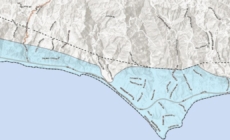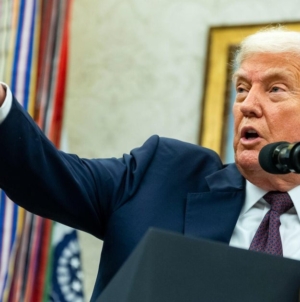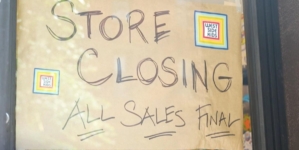-
Cowboys QB Makes Positive Statement About Micah Parsons - 14 mins ago
-
Israel says it will retake Gaza City, escalating war with Hamas - 28 mins ago
-
White Sox vs. Mariners Highlights | MLB on FOX - 31 mins ago
-
UCLA should not bend ‘on their knees’ to Trump in grant talks, Newsom says - 34 mins ago
-
Golden Retriever Spends Days in ICU—Then Brother’s Visit Changes Everything - 54 mins ago
-
Order to boil water before drinking in Malibu continues due to bridge construction delays - about 1 hour ago
-
QB Anthony Richardson Leaves Colts’ Preseason Game After Taking A Hard Shot - about 1 hour ago
-
Travel influencers face criticism from Afghanistan community over viral videos - about 1 hour ago
-
How to Watch LA Galaxy vs Santos Laguna: Live Stream Leagues Cup, TV Channel - 2 hours ago
-
EPA kills $7 billion in grants for rooftop solar panels - 2 hours ago
With new tariffs in effect, economists see profit dips and price hikes up ahead
President Trump’s sweeping tariffs, which went into effect on Thursday, are likely to have a negative effect on companies’ bottom lines and cause consumer prices to rise, trade experts say.
With the new duties on imports from dozens of U.S. trade partners now in place, Mr. Trump’s foreign trade policy is expected to lead to even more dramatic cost increases for American companies and consumers, according to economists.
“Even if they might not raise prices immediately, it’s unlikely that most businesses are just going to be willing to eat the extra costs forever,” Matt Schulz, chief consumer finance analyst at LendingTree, an online lending marketplace, told CBS MoneyWatch.
The impact of tariffs on consumer prices was initially muted, explained Shulz, as firms can be reluctant to be the first among their competitors to institute price hikes. While some companies waited to see where tariff rates settled before adjusting retail prices, others took steps to absorb added costs to avoid turning off customers. But companies can’t employ such measures forever, according to experts.
“You don’t want to be the first to raise prices, even if you have a perfectly legitimate reason for doing so,” Schulz told CBS MoneyWatch. “So, I suspect once we see businesses start raising their prices more, that might embolden others to do so as well.”
That could mean a tsunami of price hike announcements from corporations, some of which have already warned of tariff impacts, or instituted “tariff surcharges” to cover their added costs.
To date, Mr. Trump’s tariffs on the U.S.’s trade partners have generated billions of dollars in revenue for the U.S. Specifically, the U.S. government collected about $30 billion in tariff revenue in July, according to the Treasury Department. That reflects a 242% jump in revenue collected from duties since July 2024.
In addition to paying down the national debt, which currently stands at more than $36 trillion, those billions in new tariff revenue may be used to issue rebate checks for Americans, Mr. Trump suggested last month.
Profit dips
Tariffs are taxes paid by importers, which must pay the fees to the U.S. Customs and Border Protection when it accepts shipments at American ports. As a result, U.S. businesses typically pass most or all of that cost to consumers through higher prices, according to economists.
“There is very little evidence that foreign exporters to the U.S. are reducing their prices,” Gregory Daco, chief economist at EY-Parthenon, told CBS MoneyWatch. “You’re not seeing broad-based evidence of price cuts by countries, and that’s an indication that foreign exporters realize that it’s U.S. importers, U.S. businesses and eventually consumers that are bearing the brunt of this tariff-induced inflation acceleration.”
Companies from personal electronics companies to automakers have already experienced the damaging effects of Mr. Trump’s foreign trade policies on profits.
On Thursday Toyota, the world’s largest auto maker, reported a 37% drop in profit in the April-June quarter and said it cut its full-year earnings forecast largely because of Mr. Trump’s tariffs. Other auto makers have also said they expect to see profit drops as a result of the new levies.
GM has projected a tariff hit of up to $5 billion for 2025, and Ford has said tariffs will cost the company $3 billion in revenue for the year.
Liquor companies are in the tariff crosshairs, too. Guinness maker Diageo said it expects tariffs to cost it $200 million a year.
Walmart in May warned that higher tariffs would force it to increase prices on a wide range of items at its stores, from bananas to children’s car seats.
Price hikes
Some companies have said outright that in order to bear the added costs from the new tariffs they’ll have to pass along some of the pain to consumers in the form of price hikes.
For example, popular consumer electronics marker Sonos, which makes speakers, said on its third-quarter earnings call Wednesday that it would raise prices on its audio devices as a result of higher reciprocal tariffs on Vietnam and Malaysia, where Sonos devices for the U.S. market are made.
Overall, as a result of the levies, Americans are expected to pay an average of 18.3% more for imported products, according to the Budget Lab at Yale, a nonpartisan policy research center.
EY-Parthenon’s Daco told CBS MoneyWatch that the higher costs being paid by companies because of tariffs is already starting to trickle down to product prices.
Currently, the average tariff rate stands at around 18% — the highest it’s been in decades, according to Daco. As a result, “the increase in the tariffs will only exacerbate inflationary pressure that [is] starting to emerge,” he told CBS MoneyWatch.
“You’re going to see more durable goods, and nondurable goods products with higher price tags,” he said. “That will feed into higher consumer price inflation and lead to a more pronounced erosion of consumer spending as more households struggle in the face of these higher prices.”
Mr. Trump has promoted tariffs as a way of reducing trade deficits with other nations and bolstering domestic jobs in manufacturing. He has also tried to assure the public that foreign producers will pay for the import taxes and has told retailers and automakers to absorb the additional expenses.
“The Administration has consistently maintained that the cost of tariffs will be paid by foreign exporters who rely on access to the American economy, the world’s best and biggest consumer market,” White House spokesman Kush Desai told CBS News.
“Despite the doom-and-gloom predictions of inflation and recession, it’s been four months since Liberation Day and inflation is trending towards an annualized rate not seen since President Trump’s first term, while a recent CEA analysis found that prices of imported goods are actually declining.”
Source link































